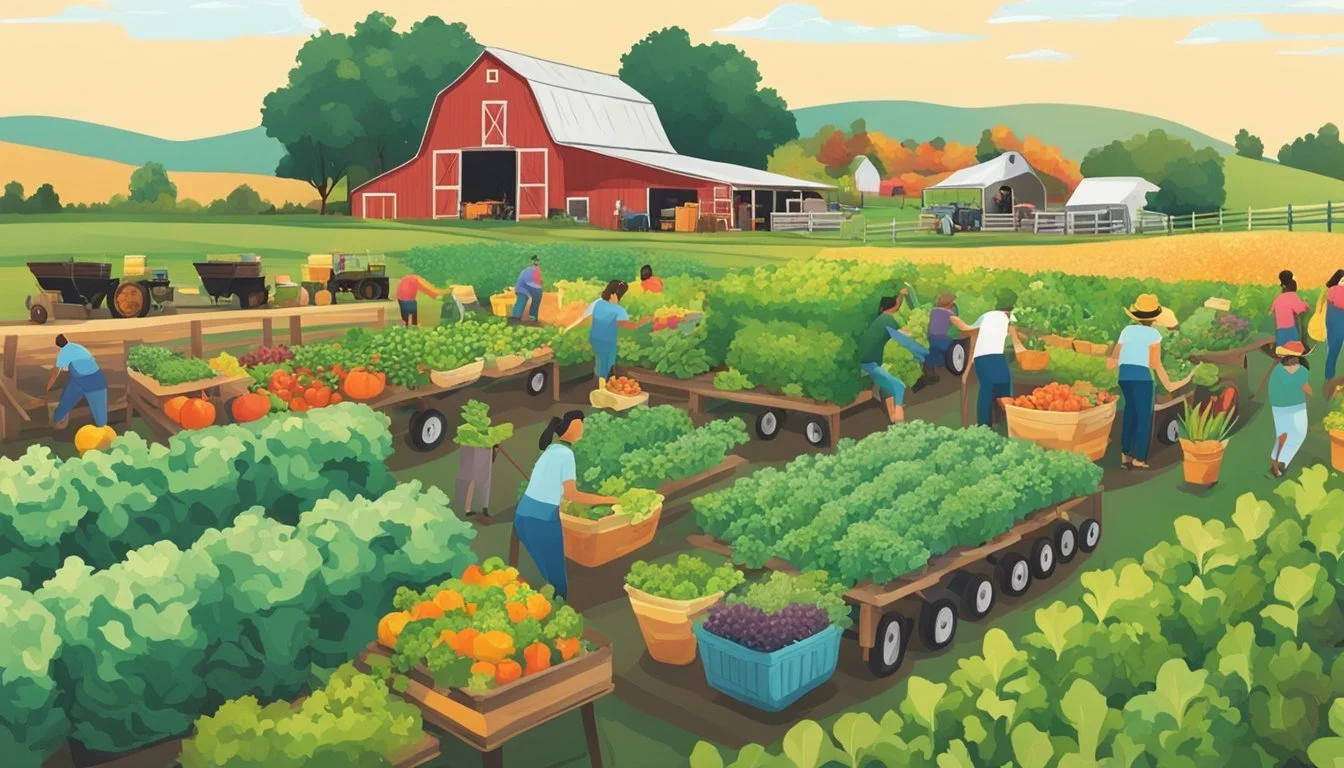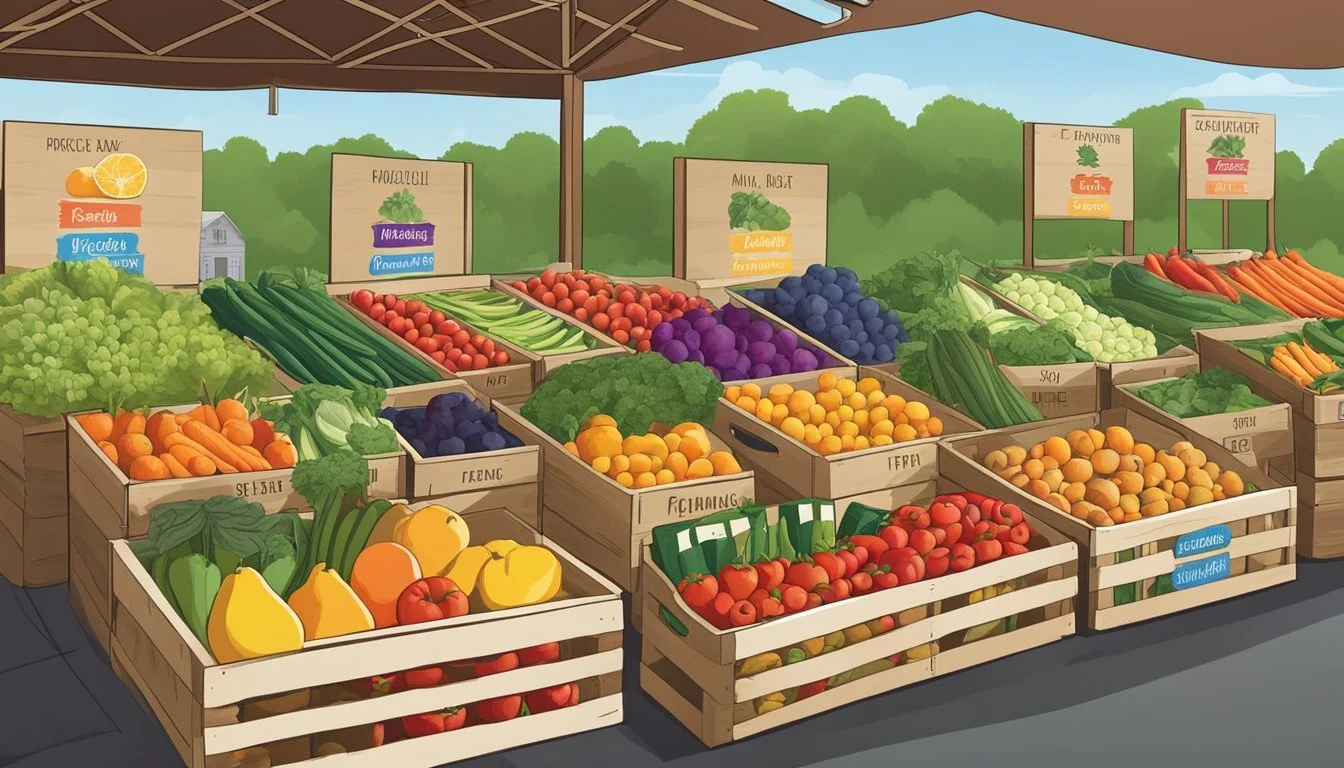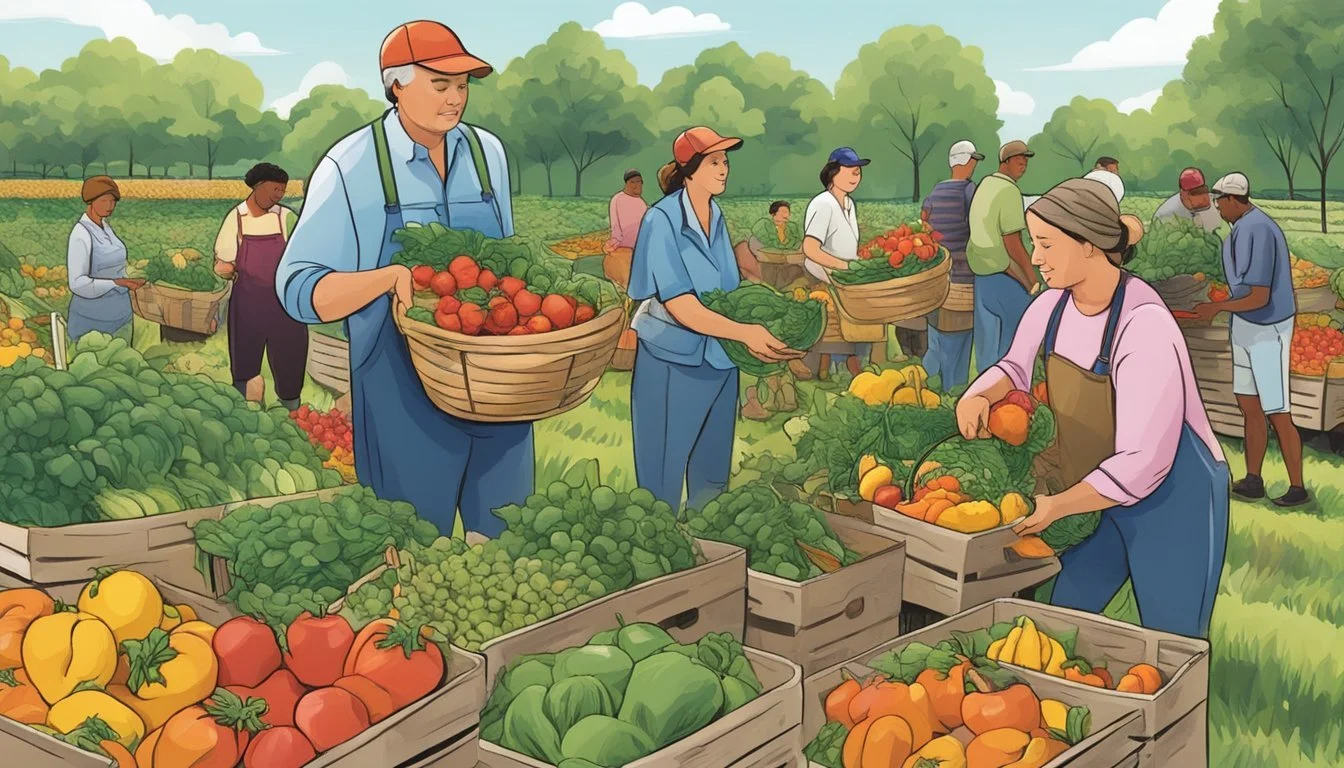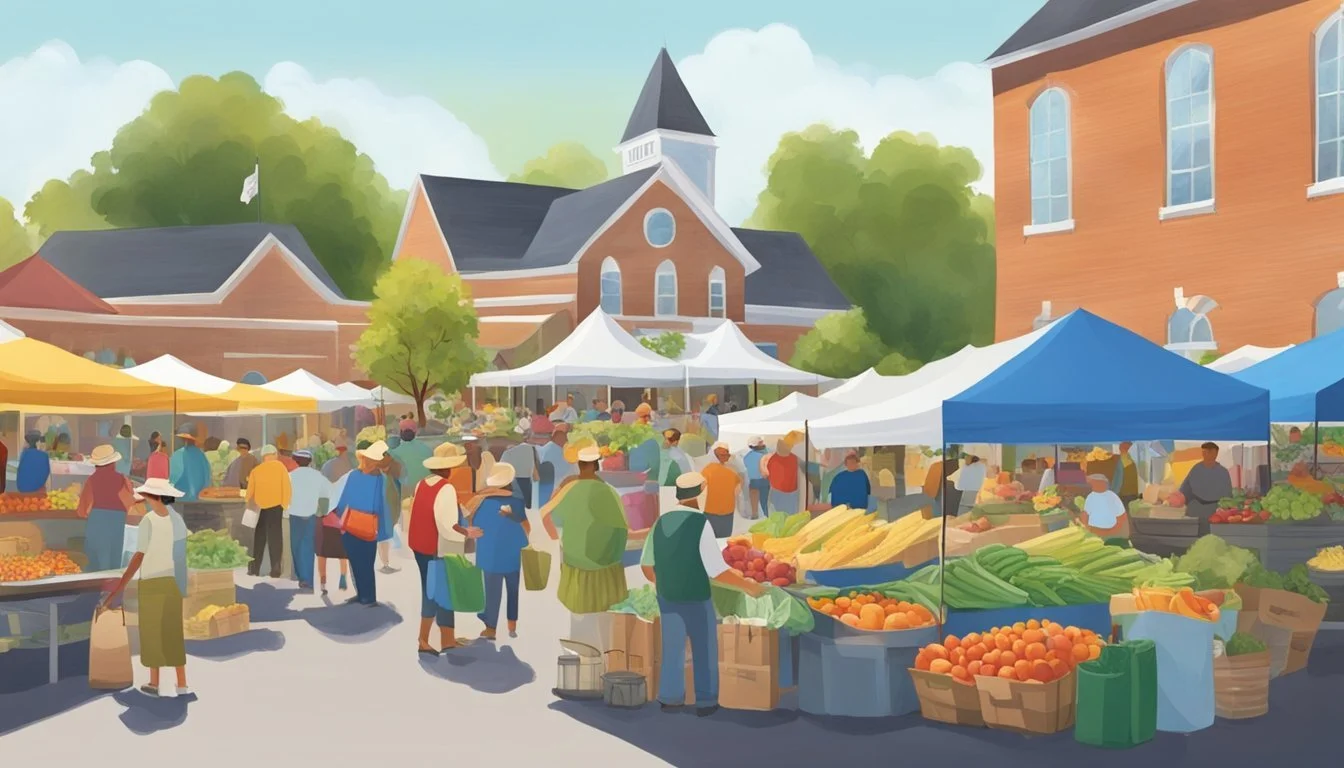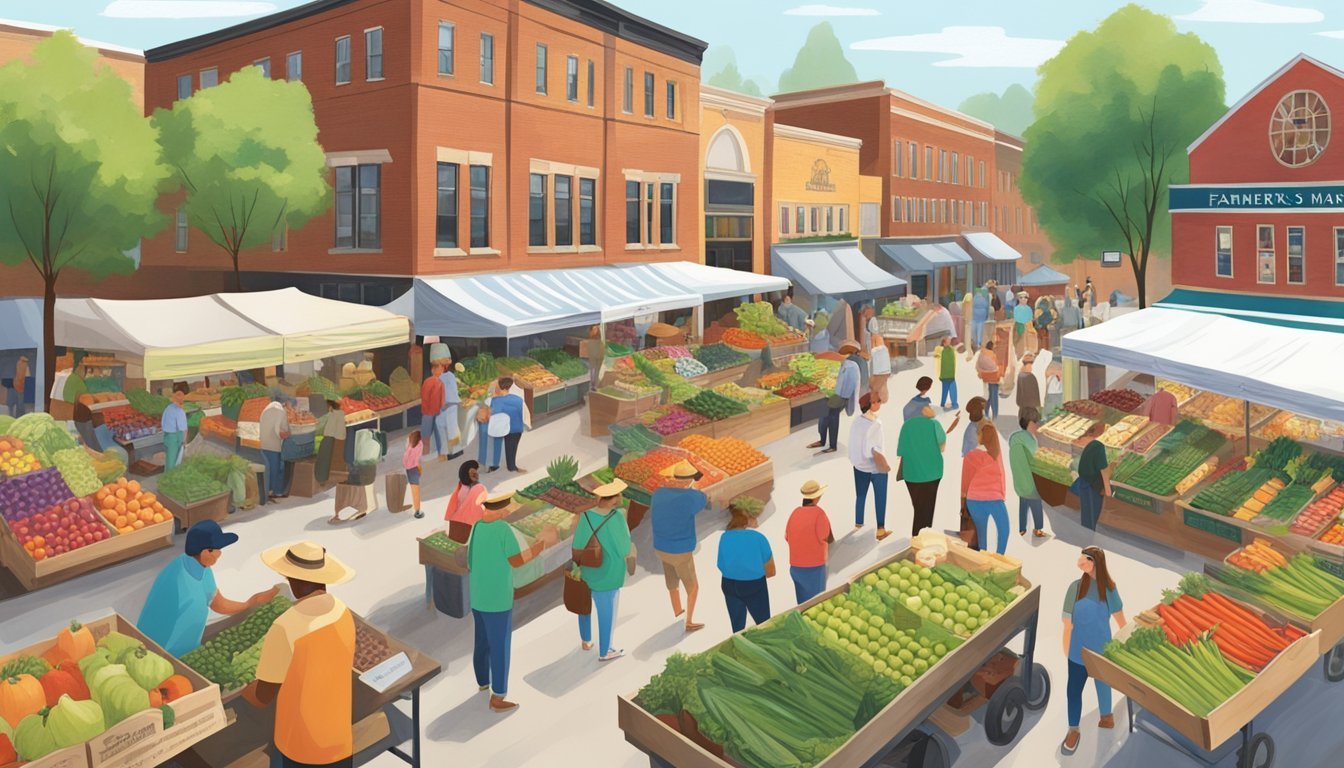Community Supported Agriculture (CSA) in Lexington, KY
A Guide to Local Farm Partnerships
Community Supported Agriculture (CSA) has taken root in Lexington, Kentucky as a sustainable approach to farming and food distribution. This agricultural model directly connects producers and consumers within the food system, fostering a mutually beneficial relationship. By purchasing shares of a farm's harvest, members of a CSA, sometimes referred to as subscribers, support local farmers financially at the beginning of the growing season. In return, they regularly receive a portion of the farm's crops, typically on a weekly or bi-weekly basis. This arrangement provides consumers in Lexington with access to fresh, locally-grown produce and, at the same time, gives farmers a sense of financial security and the ability to plan production accordingly.
CSAs in Lexington represent a commitment to organic and ecologically sound practices. Since USDA certification became a benchmark for organic produce, farms like Elmwood Stock Farm have led the way in providing organically certified meat and vegetables to the community. These CSA programs offer a range of share sizes to accommodate different household needs and budgets, demonstrating the scalability and adaptability of the CSA model.
Through the CSA framework, Lexington residents can more actively participate in their local food economy, contributing to the preservation of Kentucky's agricultural heritage. The emphasis on locality and seasonality not only bolsters the local economy but also educates consumers about the rhythms of agricultural life, deepening their understanding of where their food originates. By cultivating relationships between local farmers and the community, CSAs in Lexington are carving out a resilient food future grounded in sustainability and cooperation.
Understanding CSA
Community Supported Agriculture in Lexington, KY, revolves around a cohesive bond between local farmers and community members. This collaborative approach offers fresh, USDA certified organic produce through a subscription-based model known as CSA.
Basics of CSA
A CSA program operates on a simple yet profound premise: community members subscribe to receive a weekly or bi-weekly share of vegetables and other farm products throughout the growing season. By purchasing a share in advance, subscribers are effectively investing in local farmers' production capabilities which typically includes a variety of organic produce.
Here are key components of a Lexington CSA:
Share: An allotment of farm produce that members receive on a regular schedule.
Community: The collective of CSA members and local farms.
Season: The time-frame during which the CSA operates, aligned with the growing season.
Benefits of Joining a CSA
CSA membership provides a plethora of advantages, tangible and intangible, for both consumers and producers. Participants receive fresh, organic produce that often surpasses what's available at traditional retail outlets in quality and nutritional value. Plus, subscriptions can include CSA vouchers, further bridging the gap for various economic backgrounds.
Benefits for members:
Weekly Share: Guaranteed, diverse selections of fresh produce for personal culinary use.
Sustainable Living: Support for environmentally responsible farming practices.
Community Engagement: Direct investment in the local economy and agricultural sector.
Challenges of CSA Membership
Despite the benefits, CSA members might face challenges. Fresh produce is subject to the whims of weather and other uncontrollable factors, meaning that a shareholder's weekly bounty might fluctuate. Additionally, upfront payment can be substantial, although some CSAs offer installment plans or vouchers to alleviate financial stress.
Challenges encountered include:
Fluctuating Yields: Variability in produce quantity or variety due to natural conditions.
Financial Commitment: Initial investment before the start of the season.
Learning Curve: Adapting to the CSA model and managing the weekly influx of fresh produce.
Local CSA Options in Lexington
Lexington, KY, provides a variety of Community Supported Agriculture (CSA) programs where residents can subscribe to receive fresh, local produce, and meats. These CSA options offer weekly farm shares that include a range of organic and sustainably farmed produce, along with other farm-fresh products.
Elmwood Stock Farm
Elmwood Stock Farm is a sixth-generation family farm, sprawling over 550 acres near Georgetown, Kentucky. They have been USDA certified organic since 2000. The farm offers a seasonal CSA program that includes organic vegetables, berries, pasture-raised eggs, poultry, pork, as well as grass-fed beef and lamb.
Rootbound Farm
Rootbound Farm emphasizes on providing USDA certified organic produce through its CSA program. Subscribers can enjoy a diverse selection of seasonal fruit and vegetables, with the commitment of sustainable farming practices.
Hickory Grove Farm
As a certified organic farm, Hickory Grove Farm is dedicated to producing a variety of USDA certified organic vegetables. Their CSA program connects consumers directly with their local farmers, ensuring weekly shares of fresh produce.
Lazy Eight Stock Farm
Lazy Eight Stock Farm is known for its commitment to sustainability and a CSA program that includes organic vegetables and meats. They carefully curate their farm shares to provide an array of fresh, organic produce to their members throughout the season.
Sustainable Harvest Farm
Sustainable Harvest Farm stands out for its use of sustainable methods and being a certified organic farm. Their CSA farm share brings a combination of fresh vegetables and fruit to the local community, supporting both the environment and the subscribers’ health.
CSA Membership Details
Community Supported Agriculture (CSA) programs in Lexington, KY offer a variety of membership benefits, including access to fresh produce, eggs, and meat, all while supporting local farms. Membership details such as share size options, cost, and seasonal availability are important for participants to understand before they commit to a CSA.
Share Size Options
Participants can choose from different share sizes depending on their household needs. Farms typically offer a range of share sizes from smaller shares suitable for individuals to larger ones fit for families. The share content may include a combination of vegetables, fruits, herbs, flowers, eggs, and meat. A full or regular share is weekly, while smaller or mini shares might be collected less frequently.
Cost of Participation
The cost of a CSA membership can vary, but typically ranges between $462 to $704 for the season. The price is influenced by the share size and the frequency of delivery (e.g., weekly, bi-weekly). To join a CSA, members often pay in advance, giving the farm necessary capital to cover the upfront costs of the growing season. CSA programs may also require a Household membership fee, which helps support farm missions beyond the share including food access, education, and community outreach.
Seasonal Availability
The growing season in Lexington, KY, generally determines the seasonal availability of the shares. Members receive their shares of the harvest during this time, which can vary from farm to farm. It often spans from spring to fall with some farms extending into winter, offering storage vegetables and other season-extending products. The actual start and end dates can vary, and members are typically notified by the farm of the specific timeline for the season.
Support and Educational Resources
Community Supported Agriculture (CSA) in Lexington, KY benefits from robust support and educational initiatives. Anchored by institutions such as the University of Kentucky and bolstered by innovative employer-sponsored programs, these resources aim to enhance local food systems while supporting both farmers and community members.
University of Kentucky Extension
The University of Kentucky operates an extension program that focuses on Community Supported Agriculture as a critical part of its Sustainable Agriculture curriculum. This program offers educational resources and research opportunities, aiming to support local farmers and community members engaging with CSA programs. The University of Kentucky CSA project is especially influential, providing hands-on experience for students and fresh produce for subscribers.
Employer-Sponsored CSA Voucher Programs
Several businesses in Lexington have integrated CSA Voucher Programs to encourage healthy eating and support local agriculture among employees. These programs typically involve partial payment upfront for CSA shares, which provides farms with essential working capital. Participating employers purchase CSA shares that are then provided to employees, fostering a direct link between local farms and community members.
Kentucky Farm Share Coalition
The Kentucky Farm Share Coalition works closely with businesses to set up Workplace CSA programs, making it convenient for employees to receive weekly shares of fresh produce. The Coalition not only facilitates farmer-consumer relationships but also provides a financial incentive to employees to join CSA programs. The sliding scale payment system allows for varying levels of participation, ensuring that CSA shares are accessible to a wide range of community members.
Through these educational initiatives and support systems, Lexington's CSA landscape thrives, reinforcing the connection between businesses, employees, and local farmers.
Community Involvement and Impact
Community Supported Agriculture (CSA) fosters a symbiotic relationship between local farms and Lexington residents, enhancing the local economy and advancing environmental stewardship through sustainable practices.
Building Relationships with Local Farmers
Lexington's CSA programs allow community members to build direct relationships with local farmers. Partner farms such as High Five utilize hands-on, sustainable methods, reinforcing the bond between consumers and those who grow their food. These connections enable communities to understand and trust in the process from farm to table, creating a transparent food system.
Economic Benefits for Local Economy
The economic impact of CSA on the local economy is substantial. When families and businesses participate, they ensure a steady income for small farms, such as those in the Kentucky Farm Share Coalition. This coalition reports CSA shares costing between $462 to $704 for a season, translating into guaranteed working capital for farmers. It highlights a model where community investment in local agriculture circulates within the region, boosting its economic vitality.
Environmental Sustainability Practices
Environmental benefits are at the heart of CSA, with partner farms prioritizing regenerative techniques. They often avoid synthetic pesticides and petro-chemical fertilizers, instead opting for locally sourced composts and low-impact machinery. Such practices underscore a commitment to the land that is both sustainable and ethical. For example, local farms offering USDA Certified Organic meats and vegetables contribute to healthier soil, cleaner water, and reduced carbon footprints.
Additional Information for CSA Members
For members of Community Supported Agriculture (CSA) in Lexington, KY, being part of a CSA goes beyond receiving a weekly share of fresh produce. It involves engaging with the farming community through various channels and opportunities.
Weekly Newsletter and Communication
Members typically receive weekly newsletters via email that contain important information about their upcoming CSA share. These newsletters offer insights into the farm's weekly offerings and may include:
Updates on farm activities and produce availability
Reminders for pickup times and locations
Recipes and Usage Ideas
Alongside their share of organic vegetables and herbs, members often have access to a variety of recipes tailored to that week's harvest. These are crafted to inspire in the kitchen and to help members explore new ways to enjoy their produce. The recipe booklet may feature:
Seasonal recipes designed for cooking with the week's selections
Tips for storing and preserving various vegetables and herbs
Events and Community Engagement
CSAs are not just about food; they foster a sense of community connection. Members may be invited to participate in:
Farm events that allow for direct engagement with the farming process
Opportunities to volunteer and learn more about sustainable agricultural practices
These activities encourage community members to become more deeply involved with where their food comes from and support the broader mission of CSA programs, which includes education about food systems and promoting local, sustainable agriculture.
Conclusion
Community Supported Agriculture (CSA) in Lexington, KY, underscores a mutually beneficial partnership between local farms and community members. Through CSA programs, Lexington residents gain access to fresh, organic produce and meats, reinforcing a commitment to sustainable farming practices. Local farms, such as Elmwood Stock Farm, have embraced organic certification and contribute to the conservation of the region's agricultural heritage.
Memberships in a CSA provide individuals with a direct connection to their food source, fostering a stronger relationship with the land and those who tend it. This relationship catalyzes a more profound local loyalty and supports Kentucky's agricultural economy. The structure of CSA programs — where shareholders invest upfront in a season's harvest — equips farmers with essential working capital.
Kentucky's CSA Options at a Glance:
Type of Shares: Full/Regular and Small/Mini
Cost Range: $21 to $32 per week
Benefits: Direct support of local farmers, organic offerings, and a share in the seasonal bounty
In Lexington, CSA's impact is not solely economic; it's also cultural, influencing residents' food lifestyle behaviors towards healthier, more sustainable choices. The KY Farm Share Coalition is indicative of how community and agriculture coalesce to reinforce Kentucky's agrarian roots while promoting health and sustainability.

